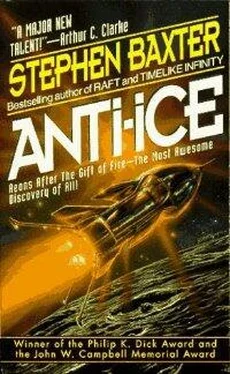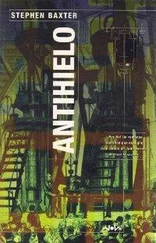Stephen Baxter - Anti-Ice
Здесь есть возможность читать онлайн «Stephen Baxter - Anti-Ice» весь текст электронной книги совершенно бесплатно (целиком полную версию без сокращений). В некоторых случаях можно слушать аудио, скачать через торрент в формате fb2 и присутствует краткое содержание. Год выпуска: 1993, ISBN: 1993, Издательство: Collins, Жанр: Фантастика и фэнтези, на английском языке. Описание произведения, (предисловие) а так же отзывы посетителей доступны на портале библиотеки ЛибКат.
- Название:Anti-Ice
- Автор:
- Издательство:Collins
- Жанр:
- Год:1993
- ISBN:978-0-246-13835-4
- Рейтинг книги:5 / 5. Голосов: 1
-
Избранное:Добавить в избранное
- Отзывы:
-
Ваша оценка:
- 100
- 1
- 2
- 3
- 4
- 5
Anti-Ice: краткое содержание, описание и аннотация
Предлагаем к чтению аннотацию, описание, краткое содержание или предисловие (зависит от того, что написал сам автор книги «Anti-Ice»). Если вы не нашли необходимую информацию о книге — напишите в комментариях, мы постараемся отыскать её.
Anti-Ice — читать онлайн бесплатно полную книгу (весь текст) целиком
Ниже представлен текст книги, разбитый по страницам. Система сохранения места последней прочитанной страницы, позволяет с удобством читать онлайн бесплатно книгу «Anti-Ice», без необходимости каждый раз заново искать на чём Вы остановились. Поставьте закладку, и сможете в любой момент перейти на страницу, на которой закончили чтение.
Интервал:
Закладка:
Stephen Baxter
Anti-Ice
To my mother
Acknowledgments
I would like to express my thanks to Eric Brown and Alan Cousins who read drafts of the manuscript; to David S. Garnett for his enthusiasm for the concept; and to my agent Maggie Noach, my editor Malcolm Edwards, and the staff at HarperCollins for their hard work on this project.
Prologue
A LETTER TO A FATHER
July 7th, 1855
Before Sebastopol
My Dear Father,
I scarcely know how to address myself to you after the disgraceful conduct which caused me to leave home. I am well aware that a full year has elapsed without a word from me, and can only offer my great shame as excuse for my silence. I can assure you of my guilt at the thought that you, Mother and Ned might have imagined me lying in some dismal corner of England, alone, penniless and dying.
Well, Sir, Love and Duty have combined themselves with the extraordinary events of the past few days to prompt me to break my silence. Father, I am alive and hale and serving in the 90 Light Infantry in the cause of the Empire in the Crimean campaign! I begin this account seated in the remains of a Russian fortification we call the Redan—named for its shape after the French “tooth,” you see, an unimposing but effective affair of sandbags and earthworks—before the ruins of Sebastopol. I have no doubt that my news so far will astonish you enough—and I dare to hope that your heart will be touched by the tidings of my survival to date—and yet you must be prepared for still greater astonishment, dear Father, at the tale I have to tell. You have no doubt read in Russell’s dispatches to The Times of the final disembowelling of the fortress of Sebastopol by this fellow Traveller and his infernal anti-ice shell. Sir, I have witnessed it all. And, in view of my eternal disgrace, I regard my survival as an unmerited gift from the Lord, as so many good fellows—French and Turks too, as well as English—have fallen all around me.
I owe you some explanation of my conduct since leaving Sylvan, that dark day last year, and how I arrived on this remote shore.
As you know I took with me only a few shillings. My mood was one of self-contempt, Sir, and shame; determined to atone, I made my way by Light Rail to Liverpool and there enlisted into the 90 Regiment. I joined as an ordinary soldier; I had of course no means of purchasing a commission, and in any event I had determined to descend, to mix with the lowest of men, in order to cleanse myself of my sin.
A week after my arrival in Liverpool I was sent to Chatham, and spent some months there being shaped as a soldier of the Empire. Then, determined to submit my life to the will of the Lord, in February of this year I volunteered to join the 90 Light Infantry, in order to be brought out here, to the Turkish war.
As I waited for my transport, convinced that only death waited for me in the distant fields of the Crimea, I wanted most desperately to write to you; but my courage—which has sustained me through the most terrible carnage here—failed before such a trivial task, and so I left England without a word.
We were fifteen days coming to Balaclava; and then we faced some days’ march along the road north to the Allied encampments around Sebastopol.
I beg your indulgence to describe the situation I found here; while the campaign has evidently been reasonably well reported at home by such correspondents as Russell, perhaps the views of an ordinary infantryman of the Army—for such am I, and proud to be—will be of some interest.
Sir, you know why we are here.
Our Empire girdles the World. And our dominion is held together by the threads that are our lines of communication: roads, railways, Light Rail routes and sea lanes.
Czar Nicholas, seeking a Mediterranean port, had cast his envious eyes on the failing Ottoman Empire. So he threatened Constantinople herself—and our lines to India. Soon the Czar was worsting Johnny Turk on land and on sea; and so we, with the French at our side, went to war with him.
We entered the war under the command of Lord Raglan, who had once served with Wellington himself at Waterloo. Father, I once saw that great gentleman himself, riding through our encampment on his way to a conference with his French counterpart Canrobert. Sir, to see Raglan as I did that day, his back ramrod-stiff on his gray, his empty sleeve tucked into his coat (for the French had shot his arm off for him) and his grand, careworn, hawk’s gaze raking over us all, the same gaze that had once faced down Bonaparte himself—I can tell you I was not the only chap to cheer to the heavens and throw his cap high!
But, from the clay I arrived, there were whispers against Raglan.
His head full of days of glory against the Corsican, Raglan apparently was wont to refer to the Russians here as the “French”! And, of course, there were mutterings about Raglan’s conduct of the campaign. After all our first engagement with the Russians was at Alma, a good ten months ago, at which we administered a sound licking to the Czar’s men. What a spectacle that was, by all accounts; the Allied lines were a forest of color highlighted by the glinting of bayonets, while the ear was assailed by a tumult of noise, drums and bugles of all descriptions, all immersed in the unending hum of an armed force on the march. A fellow here describes a charge by a unit of the Grays, their great bearskin caps high above the enemy as they fought back to back, hacking and slicing everywhere…
My only regret is that I missed all the fun!
But, after victory at Alma, Raglan failed to follow up.
Perhaps we could have chased the Russkies there and then out of the Peninsula and been home by Christmas! But it wasn’t to be, and you know the rest of the story: the great battles of Balaclava and Inkerman, with, at Balaclava, the slaughter of the noble Light Brigade under the Earl of Cardigan. (Father, I might interject that early in May I had the opportunity to ride up that famous North valley, almost as far as the site of the Russian guns which had been the Brigade’s objective. The ground was gaudy with flowers, and warm and golden in the rays of the setting sun; six-point shot and pieces of shell lay strewn thickly enough on the ground, with flowers growing through the rusty fragments. I found a horse’s skull, quite clean of meat, pierced by a single bullet hole from left to right. We saw no traces of human bodies. But I heard tell of one fellow who found a jawbone—complete and blanched, with the most perfect, regular set of teeth.)
In any event the Russians survived, and—by Christmas—had holed up in their fortress of Sebastopol.
Now Sebastopol, Father, is the Russians’ key naval base here. If we could take that city the threat to Constantinople would evaporate, and the Czar’s Mediterranean ambitions would be as naught. And so we were drawn up here in great numbers with our trenches, earthworks and mines; and—since Christmas—besieged the town.
It was—or seemed to me—a farcical siege; the Russians were well enough supplied with ammo, and we had no way of imposing a sea blockade—and so the Czar’s ships supplied victuals to the besieged almost daily!
But Raglan would entertain no way of dislodging the Russians other than patient attrition. And, of course, he adamantly refused to have anything to do with suggestions of anti-ice weaponry; a man of his honor would have naught to do with such modern monstrosities.
And meanwhile we waited and waited…
I can only thank a too-benevolent Savior that I, unworthy as I am, arrived after the worst ravages of the winter here. The lads who survived all that have some tales to tell. The summer months had been benevolent, you see, with good foraging to be had, and even sufficient time for games of cricket, improvised but played strictly to the rules! But winter turned the roads and trenches to mud. There was only canvas cover—if that—and the men had to snatch what sleep was possible in knee-deep, freezing mud. Even the Officers suffered disgracefully; by all accounts they were forced to wear their swords in the trenches as the only means by which they might be distinguished from the common footsoldier! Father, this truly was soldiering without the gilding.
Читать дальшеИнтервал:
Закладка:
Похожие книги на «Anti-Ice»
Представляем Вашему вниманию похожие книги на «Anti-Ice» списком для выбора. Мы отобрали схожую по названию и смыслу литературу в надежде предоставить читателям больше вариантов отыскать новые, интересные, ещё непрочитанные произведения.
Обсуждение, отзывы о книге «Anti-Ice» и просто собственные мнения читателей. Оставьте ваши комментарии, напишите, что Вы думаете о произведении, его смысле или главных героях. Укажите что конкретно понравилось, а что нет, и почему Вы так считаете.












